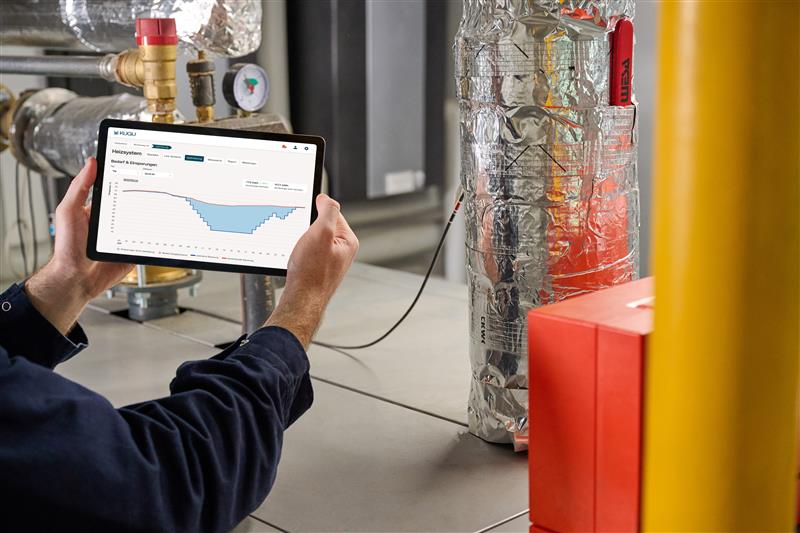Energy-efficient buildings through digital data sovereignty - The GPTI article by Christopher von Gumppenberg

The challenges of the real estate industry on the road to a CO2-neutral futures have reached a new dimension due to skyrocketing energy prices last year. Increasing costs for gas and electricity combined with failed climate goals once again and ever stronger legal regulations require energy-efficient and future-proof management of buildings more than ever. The pressure on property owners and managers is increasing.
The building sector again fails to meet climate targets
Even though the building sector already had 7 million tons of CO in 2022 compared to the previous year2- was able to save emissions, he once again missed his climate goals. With 113 million tons of CO consumed2- Emissions from the building sector have exceeded the legally permitted emissions by at least 5 tons. In addition, the downward trend in consumption is mainly due to private households, which have consumed a total of 16% less gas since the start of the heating season due to mild weather and savings measures. Experts agree that if the decline in emissions is to persist permanently and be truly sustainable, further, efficient climate protection measures are needed. The energy revolution can only work if the state, real estate companies and private households make a joint contribution to achieving climate goals.
Statutory regulations to achieve climate goals
The “Act to Restart the Digitalization of the Energy Transition” recently passed by the Federal Cabinet is occupying the industry and, in addition to many ambiguities, also gives it hope for faster and uncomplicated processes when introducing smart measurement technology. The amendments to the Metering Point Operations Act are intended to make the smart meter rollout more agile and advance the issues of data protection and sustainability. The implementation is carried out by installing remote-readable meter technology, which from now on must meet the requirements of interoperability and connectivity to a smart meter gateway. Devices that have already been installed must be converted by 2031 at the latest. Since the media has calmed down a bit about the laws on heating costs and consumption information during the year as well as on the subject of ESG, these legal requirements continue to pose major challenges for many property owners.
Digitalization and data as key drivers of the energy revolution
Although high energy prices and complicated laws pose so many problems for the real estate industry, in the end they must also be seen as an opportunity for the energy revolution — the opportunity to achieve sustainable CO through the digitalization of energy and building data management2-to reduce emissions. By collecting and processing electricity, heat and water data intelligently and scalably in compliance with legal regulations, costs can be significantly reduced and buildings can be made fit for the future. Gaining data sovereignty in buildings is the solution for energy efficiency and sustainability. Many real estate companies still lack access to the energy data of their properties, which means that they have no reliable basis for optimization and renovation decisions for their existing properties. If you want to optimize your building efficiently, you have to access your building data and evaluate it sensibly. “By collecting and processing electricity, heat and water data intelligently and scalably in compliance with legal regulations, costs can be significantly reduced and buildings can be made fit for the future.”
Data sovereignty through digital energy data platform
With the help of a digital energy data platform, KUGU Home GmbH supports residential and energy companies in finding real savings potential for energy and CO2 to achieve. The modular software-as-a-service solution uses IoT technology and artificial intelligence to make energy data transparent and evaluate it in real time: from heating bill and digitization of the boiler room to the complete decarbonization of buildings.
If smart meter technology is already installed in the building, the basis for data management can already be laid by connecting the data to the energy data platform. Devices, measurement points, user roles and tasks — the platform enables complete management from a single source. Independent consumption data collection completely saves manual reading processes and creates data sovereignty. With the leading industry solution ABsys in accordance with HKV, heating cost statements can be created independently and individual consumption values of residents can be viewed to provide consumption information during the year.
By switching on meter technology in the boiler room, systems are digitized and consumption is made transparent. By monitoring energy consumption in detail, a precise statement can be made about the efficiency of the plant, which in turn serves as the basis for the automated issuance of efficiency measures. Up to 20% of primary energy can be saved by optimising plant usage.
The technical paper was published by German PropTech Initiative e.V. published on 07.03.2023: https://gpti.de/experten-blog/energieeffiziente-gebaeude-durch-digitale-datenhoheit/







